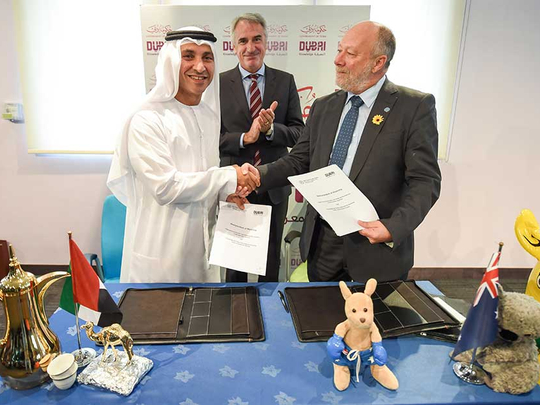
Dubai: A new five-year annual census about the well-being of children in Dubai’s private schools was announced on Wednesday, with the first findings expected in early 2018.
The census aims to reach 70,000 students in grades five to eight, equivalent to Year 6 to 10.
The project was announced by Dubai’s Knowledge and Human Development Authority (KHDA), which is working with the Department for Education and Child Development (DECD) in South Australia for the census.
The project builds on the School of Hearts and Minds survey, which has been measuring student well-being in Dubai since 2014. Last year, 87 per cent of nine-year-olds confirmed “I am happy at school”, while 68 per cent of 13-year-olds agreed, the survey showed.
When asked by journalists about any link of the census to school inspections, Dr Abdullah Al Karam, Director-General of the KHDA, said the census “is going to be, for the time being, a parallel project and I think eventually it comes down to the same thing: We want the betterment of children in terms of their well-being”.
He added: “Naturally, if their well-being is high, you will see their academic achievement … We need to reverse this [idea that] in the past, we used to talk about working hard so you can be successful in life and [then] you can be happy — it’s wrong. You should be happy now, then working hard and being successful becomes a consequence, not a prerequisite.”
The KHDA said the project will give policymakers and school leaders a detailed understanding of students’ well-being across curriculum, nationality, and grade level, enabling them to make evidence-based changes that will have long-term positive impact on their student and wider school community.
David Engelhardt, director of DECD, said: “Our experience with schools in South Australia and abroad has shown that well-being works for schools and children. We will work together with Dubai’s schools to develop a census adapted to the context and needs of Dubai and its students, the results of which will be shared with schools.”
Engelhardt said student responses will be confidential. Schools will, however, have access to the data without knowing details at the individual student level. Pupils will rate responses on a five-point scale on how strongly they agree with questions on happiness, teacher support, bullying issues, and many other points. There will also be an “other” option in some cases where students can explain their view in an open-ended format. The survey will be completed through a secure online portal, taking around 35 minutes.
Engelhardt added: “What we won’t provide data for is to create league tables. It’s entirely unhelpful to pit one school against another, particularly in this case.”
He explained that there won’t be a ranking system where one school is rated better than another in terms of student well-being.
School leaders at Wednesday’s announcement event at the KHDA office welcomed the development. Ashok Kumar, CEO of the Indian High School Group, said: “When the child is happy, there’s well-being, the productivity enhances. For the school, it means the child progresses — maybe in health, academically, or in a good family. When the good family grows, the country grows. So what they [educators and authorities] are looking for is catching them young so the well-being is there [early].”











